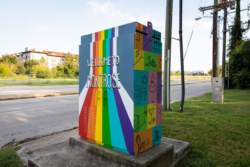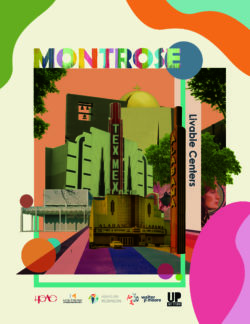

The Stonewall Inn and the neighborhood around Christopher St. in New York continues to effectively be a pilgrimage for visiting LGBTQ+ folks who want to understand how a place played a vital role in sparking our movement. Neighborhoods, or perhaps Gayborhoods, have played a key role throughout the country as both centers of activism in our cities as well as spaces for mental reprieve when it may feel like there is nowhere else you truly belong.
We completed the Montrose Livable Centers Study in early 2021, a comprehensive look at how a rapidly changing urban neighborhood could proactively improve quality of life for all residents by addressing multi-modal mobility issues, access to parks and green spaces, hotter and hotter urban environments, a rich cultural arts scene, issues with access to housing across income brackets, and more. Montrose is also widely known as the City and region’s hub for arts, counterculture, and LGBTQ+ community. This was at the forefront of our mind when we cultivated our team for the project, including a predominantly LGBTQ+ identified leadership team for both Asakura Robinson and sub-consultant Walter P. Moore, an academic advisory role for Dr. Petra Doan – an expert on LGBTQ+ planning, and a role for an equity-focused community art practice – UP Art Studio.


In late October 2020 as a part of our work on the Montrose Study, we were honored to coordinate and host a panel of national experts whose previous work has focused on planning for and with LGBTQ+ communities. Alongside Dr. Petra Doan of Florida State University, Asakura Robinson facilitated a discussion on the importance of LGBTQ+ spaces in cities across the country, including conversation about the role of LGBTQ+ spaces in the larger regional ecosystems of cities being a refuge for rural LGBTQ+ folks who may be more likely to not have safe spaces in their own communities, as well as the importance of planning in understanding how to best recognize, honor, and support the preservation of LGBTQ+ places in cities.
Panelists included: